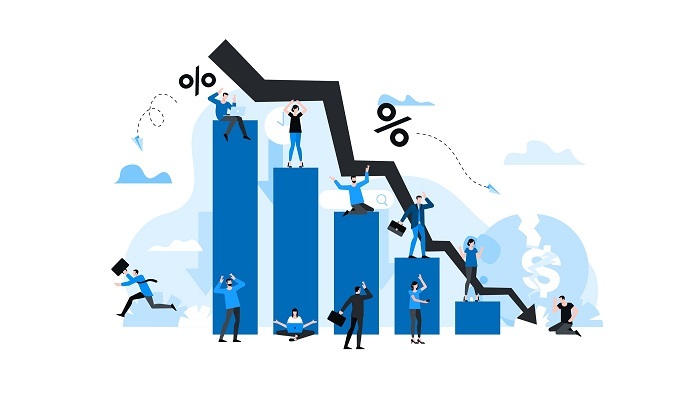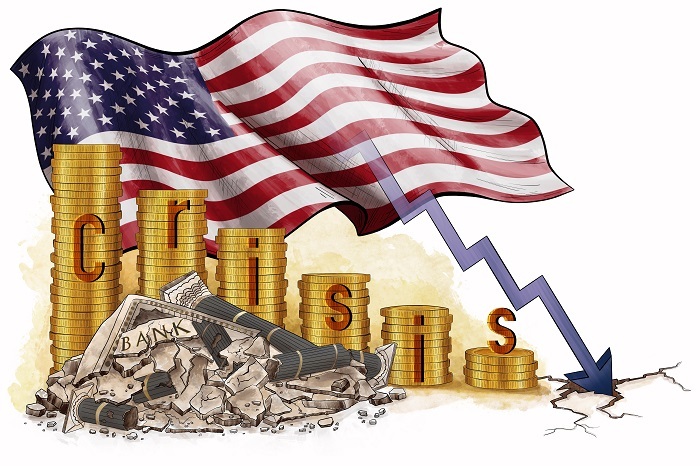
 Data Structure
Data Structure Networking
Networking RDBMS
RDBMS Operating System
Operating System Java
Java MS Excel
MS Excel iOS
iOS HTML
HTML CSS
CSS Android
Android Python
Python C Programming
C Programming C++
C++ C#
C# MongoDB
MongoDB MySQL
MySQL Javascript
Javascript PHP
PHP
- Selected Reading
- UPSC IAS Exams Notes
- Developer's Best Practices
- Questions and Answers
- Effective Resume Writing
- HR Interview Questions
- Computer Glossary
- Who is Who
How to Survive a Recession?
A recession is a time when the economy contracts and is frequently marked by a drop in the Economy, an increase in layoffs, and a reduction in corporate activity. Typically, it is seen as an international trade and financial fall that continues for at least two successive quarters or a year.

Corporations may see a reduction in revenue and earnings during a recession, which can result in job losses and lower capital expenditures. India's Reserve Bank of India (RBI) is widely acknowledged as the body that decides the beginning and conclusion of the Indian global recession. According to the Bank, a recession is "often seen as a situation of continuous drop in production witnessed across most of the business."
How do Recessions Start?
There are numerous ways for a recession to begin, including an abrupt disruption to the economy or consequences of unchecked growth. A few of the primary causes of a recession include these concepts ?
Unexpected Economic Deviation ? An unexpected issue that causes big economic harm is referred to as an economic disaster. India had a financial recession in the 1970s after OPEC abruptly increased crude prices there by a factor of two. A somewhat more famous case of a rapid economic shock is the coronavirus epidemic, which brought about the global recession.
Extreme Debts ? If people or organizations take on a large amount of borrowing, the cost of maintaining it may rise to the stage where businesses are unable to fulfill their obligations. The sector is then brought to its knees by rising bankruptcy and borrowing costs. A recession brought on by huge debts was most prominently demonstrated by the housing bubble of the mid- 90s, which sparked the Global Depression.
Property Droplets ? Whenever purchasing choices are motivated by sentiment, negative economic numbers are not far off. In a growing economy, entrepreneurs may get overconfident. When discussing the disproportionately massive profits in the stock market during the 2000s.
Technology Transformation ? Scientific developments boost output and benefit the overall economy, although there could be small durations of adaptation to them. Numerous technical advancements that reduced labor was made in the mid-1800s. Recessions and difficult times were caused by Industrialization, which rendered entire occupations unnecessary. Numerous experts are concerned that automation and AI may trigger recessions by displacing whole occupational sectors.
Excessively Inflation ? Although rising inflation is a risky occurrence, inflation itself is not always a negative thing. With increasing interest rates, commercial banks may reduce spending, but doing so reduces economic activity. In the 1950s and 1960s, the U.S. struggled with unchecked inflation. The Reserve Bank abruptly hiked interest rates to interrupt the cycle, thereby bringing a recession.
What Distinguishes a Recession from a Depression?

Financial devaluations are referred to as recessions and depressions, respectively, despite a few significant distinctions between the two.
Recessions are frequently characterized by a reduction in the Economy, an increase in layoffs, and decreased business activity. Recessions are widely understood to be a time of severe economic activity reduction. There may be a healing phase after a recession, which normally lasts for many months.
An extended and significantly worse global recession is referred to as a depression. It is often characterized by a considerable decrease in the economy that lasts over many years and is occasionally followed by massive unemployment, financial collapse, and certain other serious financial interruptions. By definition, depressions are seen to have more severe effects than recessions and are significantly more uncommon.
How to Survive a Recession?
Considering growing debt rates, unpredictable economies, and falling crude oil prices, knowing basic revenue tricks might save lives and help you escape a recession if worse goes to worst.
A recession is sadly outside of our choice, however, we do have some influence on how we react to and get ready for one.
Save money for Emergencies
Prepare Your Cash flow for Recession
Collecting a savings account is essential when getting ready for a recession because when the market begins to fail, our employment and our earnings may be in danger. In a word, a financial plan is a capital you have set up specifically to assist you to get by during periods of economic difficulty.
Emergency savings will provide you a support system to refer back on to allow you to ride the current and come out of the recession on solid knees, regardless of whether your times have been reduced, you've lost your job, your organization isn't earning any revenue, or you made some terrible financial mistakes.
Locate available Services in the Neighborhood
There are frequently several public initiatives that can assist during a financial meltdown. Such can include urgent cash to cover gaps in accommodation, groceries, and utility payments. Find out what you're intending to need and check if there is a place, group, or person that can give it to you, even if it is temporary.
Balance the Budget
A number of strategies to reduce spending in a recession. When you concentrate on reducing expenses and minimizing excessive and needless spending, you can frequently retain your current standard of living.
Invest less in luxury spending. If you don't require it to survive, don't buy stuff. Avoid being sold to. Yet when you receive a new bank card offer in the mailbox with cheap Interest and half of no charges, you should thoroughly consider it before utilizing it.
Use Carpooling Wherever Possible for Travel
Think about staying without a vehicle or riding a bike to work. Try for strategies to reduce your gas costs if that isn't possible.
Cherish Reality
Recession anxiety may be avoided if you don't allow fear to rule your activities. A strong fearful mood might make you a harsh employee and damage your connections. Remember to enjoy yourself while being grateful for the things you have. Take a Dip in the pool or trade your house for complimentary lodging as an alternative to forgoing a family trip, for instance.
Spend money on new Technology and Software
Given that the security for the borrowing is the item you purchase; equipment rentals are a reasonably simple kind of funding to get. With a surety, even newer businesses may purchase them. Instead of paying cash, we would almost always find new hardware and software purchases.
Invest in Yourself
Believe in yourselves by taking advantage of the current economic downturn. Receive training, pick up new abilities, or launch a side business. You may boost your income potential and raise your value to companies by taking these steps.
Keep Yourself Aware
Keep yourself current on the situation of the industry and the employment market. You may use this to make wise decisions regarding your job and income.
Be Adaptable
And last, be ready to be adaptable. Throughout a recession, the employment market and overall economy might be uncertain, so you could be required to modify your goals and objectives.
Conclusion
In conclusion, managing a crisis necessitates both wise personal finance and a readiness to change with the times. You can withstand the storm and perhaps even set yourselves up for success after the economy recovers by evaluating your economic position, implementing critical cuts, setting aside money for emergencies, and making investments in yourself. Due to the unpredictability of the economy during such a recession, it's critical to maintain knowledge and flexibility. You may not only tolerate but also prosper during a recession if you have the correct attitude and a well-thought-out plan in place.

